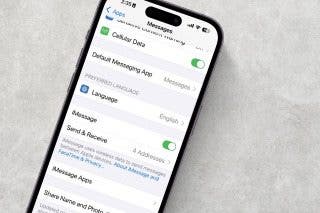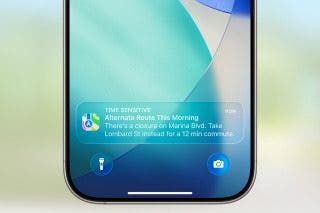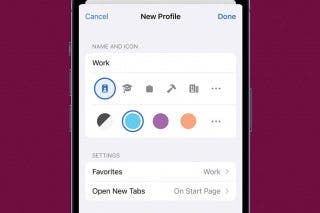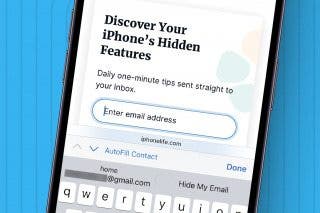What to Make of Apple's Foray into News, TV, Gaming & Credit Card Services


This special episode of the iPhone Life Podcast looks at Apple’s pivot from devices to services with today’s announcement of Apple News Plus, Apple TV Plus, Apple Arcade, and Apple Card. Sarah, David, and Donna go over the details of each service, and help answer the question—are they worth the money?
Click here to listen and subscribe. If you like what you hear, be sure to leave a review. And remember to tune in every other week to hear our editors share with you the latest Apple news, best apps, iPhone tricks, and coolest accessories.
Special Discount for Podcast Listeners!
Want more iOS how-to content that's designed to make your life easier and more productive? Visit iPhoneLife.com/PodcastDiscount and get $5 off our premium subscription to iPhone Life Insider.
Question of the week:
Are you planning to subscribe to any of Apple’s new services? Why or why not? Email your answers to podcasts@iphonelife.com.
Articles referred to in this episode:
- Apple Event Roundup: Video Streaming, News & Gaming Services, Apple Credit Card, More
- Apple News Plus: What You Need to Know Before Signing Up
- Apple Gets Games with Apple Arcade Subscription Service
- The Apple Credit Card Is Surprisingly Awesome with Solid Cash Back Rate & Financial Planning
- Apple Announced Half-Bakes TV Service, but Original Content Holds Promise
Useful links:
- Join the iPhone Life Facebook Group
- Insider walk-through: get a sneak peak of members-only benefits
- Get the Insider discount for Podcast Listeners
- Sign up for the free Tip of the Day Newsletter
- Email the Podcast
- Subscribe to iPhone Life magazine
Transcript of episode 107:
Donna Cleveland: Hi and welcome to a special episode of the iPhone Life podcast. I'm Donna Cleveland, Editor in Chief at iPhone Life.
David Averbach: I'm David Averbach, CEO and Publisher at iPhone Life.
Sarah Kingsbury: And I'm Sarah Kingsbury, Senior Web Editor at iPhone Life.
Donna Cleveland: Today we're going to be talking about Apple's services announcement that just happened a couple of hours ago. We'll talk about Apple's new TV Plus subscription service and Apple's News Plus subscription service and what you should make of it. If it's something that we think is worth purchasing and we'll get into all the details of the other services announced today too, because there's a lot that Apple unveiled.
David Averbach: A lot, a surprising amount really.
Donna Cleveland: Yeah. So, we'll be getting into all of that in a moment. We actually do not have a sponsor this episode. So, I wanted to take a minute before we jump into the rest of the episode to talk about our own premium subscription service. Some of you already are going to be aware of it. We have a free Daily Tips Newsletter. So, some of you may already be on this newsletter which with that we send you one tip each day that teaches you something cool you can do with your phone. And if you upgrade to our premium service, this is our full educational service that really will help you get the most out of your devices. We know so many people have iPhones and iPads, but they have capabilities they're not taking advantage of and a lot of times it's just easy to hit a wall and not know what to do. So, that's where iPhone Life Insider comes in.
Donna Cleveland: We have video guides included in that, that will teach you how from start to finish, how to use your iPad, how to use iOS 13 for instance. This fall we'll have guide that will teach you how to use the new operating system. So, you'll be among the first to know. You get a digital subscription to our magazine, iPhone Life Magazine has been around for ten years. You get a full archive of our issues and you're the first to get our new issues. You also get video versions of our daily video tips. So, you can learn to do something with your phone in one mindset a day just by following along on your device as you watch the video. Also, a feature called Ask an Editor. So, if you're having an tech problems, you just email us and we'll help you find solutions. So, it's a really amazing service.
Donna Cleveland: Lastly, you get exclusive content from this podcast. So, today we're going to have an exclusive section of our podcast where we talk about Apple's new devices they just released. We talked about the iPads last week. This week we'll talk about AirPods. Apple has finally come out with a new set of Air Pods with upgraded features. Woe, we'll break down for you what these new AirPods have to offer and whether they're worth the extra money. So, stay tuned for that.
Donna Cleveland: So, iPhone Life Insider is really awesome. It's how you also support what we're doing here. So, if you subscribe to any of our free services and you want to support iPhone Life, we appreciate you subscribing as well. For podcast listeners, we have a special deal. Go to iphonelife.com/podcastdiscount and you'll get five dollars off your annual subscription. So, we recommend you check it out: iphonelife.com/podcastdiscount. We have a couple of people who recently signed up with this discount. Paul H., Jonathan S., and Michael H., thank you for joining us.
David Averbach: Thank you all for the recent Insider subscribers, to all our Insider subscribers, thank you all for tuning in and we appreciate the support for our future Insider subscribers. I feel like we're very on brand with the premium subscription service of our own today.
Donna Cleveland: I know. I know. It's true. Yes. So, let's jump into the announcement.
Sarah Kingsbury: All righty.
Donna Cleveland: So, I guess let's just go in the order that Apple announced their services. First Apple talked about news. So, Apple News Plus is their premium service. It's 9.99 a month. It includes more than 300 magazines and it includes a subscription to the Los Angeles Times as well as the Wall Street Journal. So, those are the basics of what Apple News Plus offers. Am I missing anything, you guys?
David Averbach: You know, I think certainly when you say a subscription to those two couple caveats. First of all, in general, how it works is you can read any article from any of the magazines or those two newspapers discussed. So, that's kind of the main thing. It's like the "Netflix" of magazines. For those of you who remember, this is basically Texture, which Apple bought ... how many years ago? A couple of years ago?
Sarah Kingsbury: Yeah, sounds about right.
Donna Cleveland: Yeah.
David Averbach: So, they're basically rebranding Texture and adding a few more titles. Now, the Wall Street Journal is an interesting one, because the rumors are, and I guess this isn't quite confirmed yet, you don't get a full Wall Street Journal subscription. You get access to a limited number of articles or something to that effect. So, it will be interesting to see how that all plays out.
Donna Cleveland: Yeah. I mean, Apple didn't talk about this at the announcement, but they just said the Wall Street Journal is included.
David Averbach: Yeah.
Donna Cleveland: I was like that's so awesome considering that the Wall Street Journal is expensive.
David Averbach: Yes.
Donna Cleveland: It's something ... how much is it a month? It's like -
David Averbach: Someone said $40 a month.
Donna Cleveland: Yeah, it's a lot. It's definitely hundreds of dollars a year. So, it makes sense that the Wall Street Journal wouldn't want to give away their full service to people to be included with 300 magazines and all of that all for under ten dollars a month.
David Averbach: Yeah, no. It didn't make sense for them to include it. But it was interesting that they didn't add that caveat in the presentation.
Sarah Kingsbury: I know.
Donna Cleveland: Yeah, because like ... so, right now with the Apple News app, you can read I think a couple of Wall Street Journal articles before you hit the pay wall and it'll make you sign up for that. So, really it's sounding like it's going to be a similar experience to what you have right now in the Apple News app where there's still going to be tons of free content on there, but they'll just be more places where you're going to be hitting to prompt to sign up for this Apple News Plus service. So, to me, it's sounding like it's going to suck for people who don't want to pay for it, because right now if you're using Apple News, you're going to be hitting a lot more prompts to upgrade all the time. So, I think that's like the first thing that I definitely, like I think that in general with this announcement for people who don't want any of these services, like Apple's becoming a little bit worse to use.
David Averbach: Yeah.
Donna Cleveland: You know?
David Averbach: Totally.
Donna Cleveland: But for people who are interested in them, I don't know 9.99 is a bad deal for what you get.
Sarah Kingsbury: No.
Donna Cleveland: I mean, it's a little bit hard to say without having used it yet.
Sarah Kingsbury: There is a free trial, right? So, you can decide if it's actually worth it before committing.
Donna Cleveland: Yeah, those are the other things that are available today apparently, although Sarah keeps checking back.
Sarah Kingsbury: I just checked right now. It's still ... I mean, they might be ruling it out. So, it might be available to some people, but it's not available to me, which is all I care about.
Donna Cleveland: Yeah. So, it's available today. You get a free month trial. So, it's nice just everybody can check it out for themselves without making any commitments yet.
David Averbach: Yeah.
Donna Cleveland: I do like that there's no extra charge for family sharing.
David Averbach: Yeah. They did that across most of their services, which is nice.
Donna Cleveland: I would like them to do that across Apple Music as well.
David Averbach: I feel like they will. I fell like that's coming, because that seems to be their new strategy.
Sarah Kingsbury: What's the family deal with Apple Music again?
Donna Cleveland: I think I pay like 14.99 for a family subscription, which I think includes five or six people.
David Averbach: Okay. Seems reasonable.
Donna Cleveland: Yeah, I'm not, you know, I've been very happy with tit. I'm just like how come all these other ones have the family sharing?
Sarah Kingsbury: Yeah.
David Averbach: So, I think a couple questions. We've got a few questions for each of these. The first one is Apple came out with basically to summarize their value proposition we're going to say do we think that they hit the mark on that? So, what was their value proposition for this one?
Sarah Kingsbury: That they are ... they didn't say that they are trying. They said they are creating the best mobile magazine reading experience ever.
Donna Cleveland: So, they spent a lot of time showing examples of what the new reading experience will be like and they had something called live covers. So, it looks like there's a new tab in the news app that you go to and you can open up different magazines. Like, they have more than 300 magazine covers there. You can scroll through, pick one, and then it had moving ... it almost looked like a live photo, because it would only be like three seconds or something like that.
Sarah Kingsbury: It'll just look like Harry Potter World.
Donna Cleveland: Yeah, totally.
Sarah Kingsbury: The pictures that you can talk to and the collectors cards where you know, they interact with you.
Donna Cleveland: To be fair, it looked really cool.
Sarah Kingsbury: It is.
Donna Cleveland: Of course, the one they chose for their presentation is going to look really cool.
David Averbach: Yeah.
Sarah Kingsbury: Yeah.
Donna Cleveland: So, it's a little bit hard to tell, like David made the point, how many publishers are going to spend the time to create like iPad and iPhone special versions of each issue. Like, as publishers we know how much of a pain that would be, but for the ones that do, it did look ... it looked really beautiful, which to me matters, like I've loved magazines for a long time, and part of the reason I don't like Kindle's magazines is the experience just isn't that great and I like you know, magazines are really visual and they put a lot of time into like the experience it provides for someone reading it more so than a newspaper. So, I like that it looks like they're putting a lot of thought into that and creating tools for publishers, but it really is ultimately on the publishers to be doing that extra work to present their publications through Apple News Plus. So, I am also a little bit skeptical, like you are David, that most of those magazines are really going to do that all the time, you know?
David Averbach: Yeah. And I think they're hitting their mark in terms of it did look like a very well designed platform to read magazines. It looked very sleek. The examples they gave, like it was really nice. It felt immersive. I think unlike say the premium television service that we're going to get to later, where they have very clear competition with Netflix and Amazon and everybody else, this one, there's no one else out there really doing this on the scale. Like, there's no other Netflix for magazines. So, it wasn't that hard of a mark to hit in that sense, because they didn't have a ton of competition. You know? And it's kind of interesting watching them spin this, because they're basically rebranding something that they bought a couple years ago that already had a lot of this stuff. So, I think, yeah.
David Averbach: I would sign off on the best digital app experience, you know? But to me, I think the value is how many magazines do they have? Are they the magazines people want to read? Are people willing to pay for that? Because I think that I'm skeptical that it's going to be so different as far as an immersive experience that people are going to pay for that as opposed to say a different service that were to offer the same magazines. Does that make sense?
Donna Cleveland: Yeah. I mean, if they have really good magazines and we were just talking about how when kids do like the magazine fundraisers, I never want to actually subscribe to any of the magazines even though I want to help the fundraiser, because there's a lot of magazines out there I'm not interested in. So, it has to be something good. But I think what's going to make the difference for whether their magazines or news outlets that we want to read is how great it is for the publishers, because another claim Apple made was it's gonna be great for readers and publishers, but it sounds like Apple's one taking a lot of revenue and two controlling all access to the subscribers so you can't even like really track what your readers are engaged with so you can give them more of that.
David Averbach: yeah, and you can't control the monetization very well in the same way you can with your own audience. So, yeah. That's definitely another issue. I'll give you my take as a publisher of a magazine. I think that it depends where your magazine is situated. I think that it makes a lot of sense to me that the New York Times and the Wall Street Journal did not participate in this and the LA Times did, because I think that if you view this as primarily a monetization tool, I think you're going to be disappointed, because Apple, of course, taking a high percentage of it and also you have a lot less control. You don't own your customers. But if you're viewing this as a customer acquisition tool, it's pretty intriguing.
David Averbach: So, it sort of depends. I think the Wall Street Journal, New York Times, places like that, Washington Post, everybody knows who they are and so they're less trying to like get people to hear about them and discover them and more trying to get people to pay them; whereas, some of the other services if you haven't heard of them, I think it's pretty intriguing. So, I think in that sense, it depends what the publisher's trying to do and it makes sense who joined and who didn't in that regard.
Donna Cleveland: Yeah, there's also I guess a lot of publications who don't have print publications, like digital subscriptions. The Skim and I can't remember the other ones, but I guess if that's the way to acquire more readers for them as well.
David Averbach: Yeah, absolutely. Absolutely. So, I think the next question we have here and we're going to have it for each of these is: A, would you guys be interested and B, we have the poll results, our instant poll on -
Donna Cleveland: Yeah, I was just checking those.
David Averbach: Our instant poll on was our audience interested. Do you want to update us on that?
Donna Cleveland: Yeah. One thing I just wanted to mention. I remember a few of the titles. I wanted to throw out some of the magazine titles we saw in there. Wired, Time Magazine, National Geographic they showed a ton of, which makes sense, because they wanted to show visually beautiful things, which National Geographic does a great job of. Did you guys see any other titles there that looked intriguing to you?
David Averbach: I will say that this was originally a program that was a partnership. I can't remember all the publishers, but I think it was Condé Nast, Hearst, Time. So, it was primarily a big brand partnership. A lot of the biggest magazines in the world will be in there. Like the ones you mentioned were huge, I saw the Atlantic was in there, I would imagine Sports Illustrated would be if it's a time thing.
Donna Cleveland: [inaudible 00:14:23] was one of [inaudible 00:14:24].
David Averbach: Part of the limitations, first of all, you're only talking about 300 titles total. And so I think-
Donna Cleveland: It's not really that much.
David Averbach: What you're not going to get a small independent publishers, and I'll tell you that because we're not in it.
Donna Cleveland: One awkward moment was in there, like 3000 titles, I mean 300 like that's such a bad [inaudible 00:14:43].
David Averbach: I know, especially because the guy was literally on stage for like two minutes. And that was the one thing that he was supposed to say, we mess it up. We talked to Texture a while back about joining and they were pretty exclusive about small to mid size publishers and that's one of the things. It's a little sad about this is that I think some of the most richness of publishing comes in either regional publications or niche titles, and all of that stuff is just missing. So in that sense, I think there's a real void and a real missed opportunity for Apple.
Donna Cleveland: Yeah, that's a good point. I didn't even really think about that so much, but maybe over time, they'll add more, I don't know. But in terms of the poll results, overwhelmingly people were not [inaudible 00:15:29].
David Averbach: Yeah I was surprised.
Donna Cleveland: Because the 40 people voting no, that they didn't want to spend $10 a month on this, 10 maybes and five, Yes.
David Averbach: Yeah. And these were very instant results because we just posted these polls. So some of our numbers are not that large, and we're not going to be statistically significant. That's a pretty large margin there.
Donna Cleveland: It is. Yeah, I mean, that was interesting. I was one of the yeses.
David Averbach: Yeah, funny enough, so was I. So we're really throwing our data there [inaudible 00:15:56] way worse.
Sarah Kingsbury: I didn't vote because I hardly ever go on Facebook. But I would definitely at least try it. I mean, it's like 30 day free trial, you just set it to expire after 30 days. And then so if you forget your stuff, good, and then we have a tip on that. And then you can also just choose to renew it.
Donna Cleveland: Yeah, I know that's actually ... I always set reminders for like days later, I didn't realize you can just unsubscribe.
David Averbach: Yeah.
Sarah Kingsbury: And then-[crosstalk 00:16:23]
Donna Cleveland: ... still get it for that trial period.
Sarah Kingsbury: Right. Exactly.
David Averbach: I will say to me, it kind of depends on when I look through the titles I said, Yes, but I'm backpedaling a little bit, I want to look to the titles. I've been subscribing to New York Times for a while I just canceled because I just couldn't quite justify paying and then ... So I sort of have a little bit of money to spend on news, but I'm not sure that they're quite hitting that sweet spot for me. I'm not sure that the magazines, they have enough of them that I'm going to read them enough and it's going to be that same service that I was getting from New York time so we'll see.
Donna Cleveland: To me it was the fact that they included newspapers is what made me say yes, when at first it was just like, it's only magazines, I didn't find that to be worth it. But that being said, I don't usually go to the LA Times or Wall Street Journal as new sources. If it had been the New York Times, I'd be more excited about that. But also I'm really glad they include both of those. And so assuming they do give enough articles away from the journal and from the LA Times, I think I will go with that. Because I have a few different magazine subscriptions. It wouldn't end up being as expensive as this is but this is probably a better value than what I'm getting now and I like to support journalism. And so I like the idea of doing that. To me with I think it's interesting so many people said No, and I wouldn't be surprised if it's that like a lot of people still don't want to pay.
Donna Cleveland: It's like you can read so much online for free. I think there's going to be more resistance to the idea of having to pay for this.
David Averbach: Yeah, I have big feelings about that, as somebody who clearly is trying to convince people to pay for content, I think it's important value that you're providing by doing that. But I think the publishers, and in this case Apple has provided enough in return. And the question is, are there enough magazines that people are interested in? Is this the right way of handling it? I think they probably got there because they got such big titles, but I don't know. I want to take a look at it.
Sarah Kingsbury: Yeah, I mean, I'm a yes for the free trial.
David Averbach: Okay.
Donna Cleveland: So let's move on to the next service. Okay, we have two different sections to talk about with Apple TV. Because Apple first spent a long time just hyping their Apple TV app, they came out with a TV app with iOS 12. That sort of was the beginnings of what they're going to be doing now, which is, allow you to access all of your content, whether that's from Netflix or Hulu or another streaming service, iTunes titles that you've purchased or rented, cable content, all of that through one app. And so they were saying they're making that to be into a big deal saying that you can access everything from one app without having to bounce from app to app like you usually have to. How did you guys ... David, you seemed excited about this during the announcement.
David Averbach: I've always been excited about this vision of being able to pull in all of your subscription services into one interface and integrate that with live TV. That always seems super appealing to me. That being said, I'm a little bit skeptical that they can pull it off because that's sort of what they've been promising all along. Now, they've added a few things here that I think make it a little bit closer to that reality. I think they're going to integrate with some live TV options which is nice with dish and Hulu, it look like they're also going to allow you to subscribe to third party services, which is nice. But I think the problem with the solution like this is it's a little bit all or nothing and unless you can play nice with everybody in that industry which Apple has not been able to do that well, it's hard. So for example, we were just debating whether or not an integrated with Netflix. It seems to be that it doesn't. So if you're watching shows on Netflix, and it doesn't get pulled into your one definitive interface, how definitive is it really?
Donna Cleveland: I know yeah, it has to include Netflix.
David Averbach: Yeah.
Donna Cleveland: And we don't know, it's not coming out till the fall. Both Apple TV-
Sarah Kingsbury: Actually, the app itself is getting the software update in May.
David Averbach: Oh, okay.
Donna Cleveland: Oh, okay. So the app you get their premium services until the fall.
Sarah Kingsbury: Right.
Donna Cleveland: But I guess we have to find out sooner about the app. Another thing they really hyped which I was skeptical about was that they were going to give you really great recommendations for content.
David Averbach: Yeah.
Donna Cleveland: Already Netflix and Hulu I think will have show recommendations for you based on what you've been watching. And Apple was trying to make it like put a special spin on how they were going to do this using machine learning to tailor show recommendations to you and then also have their editors watch tons of content and tell you what the best content is to watch. Already with Apple Music, they made a big huge deal about their music curation, which I ended up not like when I used to use Apple Music. I didn't really like a lot of the music they [crosstalk 00:21:30] for me.
Sarah Kingsbury: It's still not great.
Donna Cleveland: And so I just was skeptical as soon as I heard that.
Sarah Kingsbury: I was too.
David Averbach: What I would say yeah, I'm completely skeptical first of all, because these big services do a lot of that Netflix. I know they invest millions and millions in R&D to recommend the right show to you at the right time. And so it's like, okay, Apple, we're glad you're doing that too. I think the thing that appeals to me is the same thing. It's a unified interface because I don't know about you guys, but I have shows I'm watching on Netflix right now on HBO on amazon prime and then I have a few shows I'm watching because I have a paid subscription. I have a cable subscription that I'm watching it on like a TNT app or like NBC app or random apps and it's annoying to switch back and forth and having all of those in one interface would be awesome. And I guess you could get better recommendations by having a bigger picture of what I'm watching. But I also I'm skeptical. I'm skeptical that they can pull it off still.
Donna Cleveland: Yeah, I think the way that I usually get around that right now is from the main Apple TV home screen if you just use Siri search, this the Apple TV remote it'll pretty much just like pop you right in [inaudible 00:22:35].
David Averbach: Yeah, totally.
Donna Cleveland: And so-
Sarah Kingsbury: That's what I do.
Donna Cleveland: ... it makes it pretty easy even though you still go through different apps. But I noticed watching my husband navigate it for some reason he like fight series search and just ever uses it. He does spend a long time going between the apps. So I feel like a lot of people just resist Siri and they shouldn't.
David Averbach: Yeah, sounds like your husband problem [inaudible 00:22:58].
Sarah Kingsbury: I think it's a common problem.
David Averbach: Yeah.
Sarah Kingsbury: Not just her husband. I was pretty happy, though, to see that they're bringing the app to Mac. And it's going to be available on some smart TVs and like Roku and Fire Stick.
David Averbach: That was interesting. I think the thing that I was excited about is that Apple's focusing on this. Because this feels like a problem that if anybody's going to solve, it's going to be Apple despite my a little bit of skepticism on it. We're going to get to this later, original TV. That is not a problem that you point to App and Apple is perfectly situated to solve, but a hardware-software solution that involves large companies to work together. That's Apple strong suit, that's their wheelhouse. And I'm glad they're giving up on those types of projects in lieu of some of these other projects, which we'll talk about, but spoiler I'm skeptical.
Donna Cleveland: Yeah. So I feel like this should be an improved experience for the free version for people but let's get into Apple TV plus now. So this is kind of this fall they didn't give a date they didn't give a price. I was a little disappointed I want to know. What are we talking here? So apple TV plus from ... it was a little bit vague the way they described it but they teach tease a bunch of original content they're spending $2 billion this year producing original content. Was there anything else to add about that? I guess that's pretty much all we know about it.
David Averbach: They teased a lot of shows they had a lot of celebrities come on stage. Oprah was there Jennifer Aniston was there, Reese Witherspoon. So they clearly are going ... they're doing this big, this is not a half baked effort by Apple.
Donna Cleveland: No it's not. But it's interesting because I feel like the way they were talking about it they're trying to make it sound like something really special and different but then we're all like, "Wait." But like pretty much it's just a Netflix competitor. Except for less it's like only original content from Apple. I think the way they're going to get people as if they have shows that sounds really cool, and people don't want to miss out. So they decided to pay for yet another streaming service, but it's not replacing any streaming services. Like they're saying it's ad free. And it's like, yeah, well, if you're paying for shows like da. The only thing that has ads left is it pretty much just live.
David Averbach: Hulu, depending on your subscription?
Donna Cleveland: Oh, yeah. Hulu does have ads? But yeah. It is a little bit like why is this so different? This is pretty much just like joining the ring with Hulu and Netflix.
David Averbach: Yeah, totally.
Sarah Kingsbury: Yeah, it's interesting, because like David was saying, and I was saying before this podcast, with each section they sort of like came up with their value proposition. Here's what we're doing with this cool thing. And what they said was the purpose of this seemed a little like uninspiring, even though they tried to make it very inspiring. It was like we're going to tell great stories that connect us. That's really nice idealistic idea but why does that make me want to subscribe to a streaming service?
Donna Cleveland: Yeah, they have this whole promotional video, it's like directors and producers and actors talking about the purpose of storytelling and it's like those things are all true but you're wondering what ... already that's what TV and movies are doing and they don't really sell anyone on that, the entertainment business is booming.
David Averbach: Yeah totally. And I think the thing I just kept finding myself wondering both leading up to the announcement with all the coverage of it and during, is like does the world need another Netflix? Why Apple? Why is Apple going to be the next Netflix? And is Apple positioned to be the right company for that? Because it just seems like such an everything about it just seems so unusual. They haven no clear value proposition as far as I'm concerned. They gave no clear reason why this is better than Netflix or than Amazon prime. The only value proposition they're giving is the have original content, which everybody has. So it's sort of like, Are there shows good enough to steal you away from the other services? And the answer is, we don't really know. But they don't have a ton of shows. So they're gonna be pretty amazing to steal you away, because Amazon has so many shows, and Netflix as well. So it's really confusing on all fronts. For me.
Donna Cleveland: I know, unfortunately, with these services, it just looks like I'm going to be spending more money on stuff like it's not like I can buy this instead. And anything else, it's pretty much I probably would keep my Netflix and then also be buying Apple TV plus, which I might do if there are original shows that are interesting enough, but it's not something I'm going to be super excited. I'm not like, "Oh, yeah, I get to spend more money on another streaming service.
David Averbach: And somebody made the comparison to the home pod. When Apple came out with ... something on our Facebook group did, when Apple came out with the home pod, they were so far behind Amazon, because Amazon had Echo for a long time. And I made the point on the Facebook group that, yes, that was true. But Apple had an inherent advantage and that it could tightly integrate the home pod with its ecosystem in a way that the Echo could not be integrated with Apple's ecosystem. And so even though it wasn't as feature rich, it's still had a lot of clear value propositions that the echo did not have on iPhone owner. Where's that is not true for this. There is no inherent integration benefit that Apple is getting from this. They're just directly competing with Netflix and in my opinion, failing to provide a clear differentiation.
Donna Cleveland: We have people adding new entries into the pole because I asked people if they're planning to get Apple TV, plus. We had someone enter in, I have too many shows that I watch now can't get to them all. A few people voted on that. And then someone else put depends on price and more people voted on that. So I think a lot of people only one person said yes. And I think it's just hard for anyone to say yes, yeah, without knowing how much it's going to cost or really, how much original content are you going to be missing by not getting it.
Sarah Kingsbury: Yeah.
Donna Cleveland: So we had a listener question that I just wanted to ... someone just wrote in asking about Apple news plus, and asking, how would this be better than Flipboard which you get for free? So for people who don't know what that is, Flipboard is already a news aggregator app where you can basically read newspaper and magazine articles and blog articles and follow topics you want and aggregate it all together into one app, and it's pretty awesome. We're on there.
David Averbach: Yeah we are on there. I'll attempt to answer this. My understanding having used Flipboard but it's been a while so maybe they've added stuff I don't know about. Is that they are basically aggregating free online content. Whereas so that's comparable to apples free Apple news. And in fact, a lot of people when Apple came out with Apple news accuse them of stealing Flipboard. [crosstalk 00:30:16]. Yeah. Whereas this with the paid service, it will be aggregating content that you typically would have paid for via subscription. So it's mostly magazine content, that either would be a digital magazine, you'd be paying for a print magazine, you're paying for it. Instead, they're aggregating it all within one app. Would you agree with that?
Sarah Kingsbury: Yeah.
Donna Cleveland: Same thing with the LA Times and the journal, which is also included, like you really can't get that free for it anyway. So yeah.
Sarah Kingsbury: I just have to say, I mean, kind of like most things, when you pay for content or that means people are being paid to produce it and there's a lot more just production value, a lot more time and just hard good work goes into it because-
Donna Cleveland: And accountability.
Sarah Kingsbury: Right? Yeah, So that's an important difference. If you're happy with the free content you're getting and we do free content, but it's paid for by advertising.
David Averbach: Yeah.
Sarah Kingsbury: So it's really not free you're paying with your time and attention to ads. So to me that would be the value in it as compared to Flipboard is that I might have access to higher quality content. The question is if it's the high quality content that interests me.
David Averbach: Yes, absolutely. Great answer.
Donna Cleveland: Yeah, very good. Okay. So that was Richard Beal answering his question. Thank you for adding in. So we want to move on and talk about there are two other services and these were ones that were not as much hyped up in the rumors. There's Apple arcades. This is a gaming platform that Apple came up with an Apple card, which is a credit card, which is crazy. I was not expecting that.
Sarah Kingsbury: I mean [inaudible 00:32:00].
Donna Cleveland: [crosstalk 00:32:00] so mad.
Sarah Kingsbury: [inaudible 00:32:04] did predict those things. And I remember, it's like editing it. And I was like, that's interesting [inaudible 00:32:08], that's a kind of random rumor that you're including in this article about the announcement. And he was correct.
David Averbach: Yeah. And he was mad because-
Donna Cleveland: [inaudible 00:32:17] all about it.
David Averbach: Yeah. When some of us were surprised, which made him really mad because clearly we hadn't read his article.
Sarah Kingsbury: I read it.
David Averbach: Well, you edited it.
Sarah Kingsbury: Yeah.
Donna Cleveland: Let's talk about Apple arcade first. This is the gaming service that Apple is coming out with. one was it available? I don't have it in my notes here.
Sarah Kingsbury: I have it in my notes. I believe it's coming in the fall.
David Averbach: Okay.
Sarah Kingsbury: And it will be available in 150 countries and they did not tell us the price.
Donna Cleveland: They did not tell us the price. Okay, so but it's going to be 100 games. They're only going to be available through Apple arcade. And there Apple's actually backing these game developers to create special games for this service. I am not a gamer. And so I feel like I want to hand this over to Sarah because her daughter, she thought would be interested in this. You talked a little bit about like being excited about Apple arcade. So I thought maybe that's something you'd want to talk about a little bit.
Sarah Kingsbury: I kind of wish we'd invite a [inaudible 00:33:16] on. Because I feel like this is the part of the announcement he was most excited about. And [inaudible 00:33:21] is very much a gamer. And I think it's because Apple was, in their announcement said, there are a lot of really great high quality games that you have to pay for. And it's hard for them to succeed because they're competing with all of these free games. And we want to help support these developers, we're making these high quality games really succeed. And so they're having a subscription service. And there won't be any in app purchases, and you'll have access to all the updates. And there's no ads and it's free family sharing, so you don't pay like more to include your family. And you can manage your kids access through the screen time app. Well, it's not really an app it's a setting. So I think for families whose kids play games, it's big deal because you can have control over the games and all of them are available offline, which is really important for traveling when David was mentioning, but I think as far as like adults who are really into gaming.
Sarah Kingsbury: That's exciting too. I definitely will pay for they mentioned Monument Valley. I don't know if that particular game will be included in this but I will definitely pay for a good quality game. And I think and I'm not even I wouldn't really consider myself a gamer. So I think that any adults or older kids who really care about gaming will like this, which is why I'm guessing I will end up with the subscription because my daughter spends like a huge portion of her allowance and money she earns from working on like fortnight and stuff and if they can have a game that is compelling and interesting. I think that would be worth it.
David Averbach: Yeah. I will say my partner's son used to have, he still has a Kindle fire, the kids version which comes with a similar service. And it's basically they have all these kids games and action movies too that you can download and TV shows that you can download. And it's free if you buy this, at least it's free for two years. And it was a great service. It's like he could sit there and you can view all the games he could download every one of those free and these were pretty high quality games. And then he's recently we've kind of typically uses an iPad now when he travels and so we kind of default towards buying him free games and it's really frustrating because the quality of the game often isn't very good it crashes a lot it doesn't work very well offline and then of course if it's free up front it means they're trying to ... we keep trying out all these services trying to monetize it somehow. Which means they're constantly trying to get him to buy things in the game. The whole game revolves around monetizing this person who gets invest in the game.
David Averbach: So I like the concept. Of course, again, as with all of this stuff depends on what games they have, and if they're good, and how much it costs. And Apple didn't give us a lot of that. But there's an intriguing concept that seems like it has a place in this world. Whether they can pull it all off, we have to see.
Sarah Kingsbury: It's interesting. I feel like there's this running theme that keeps coming up so far and our coverage, which is that there's really no such thing as free content, right? Like you're either paying up front, or you're paying as you go with being sold things constantly. And so it's a decision everyone has to make in terms of when you're choosing what kind of media you're going to use and watch her play or whatever, what kind of experience you want with that and what quality content you want with that?
David Averbach: Yeah, well, and I think Apple is in an interesting position to do that, in that they are not monetized by ads at all. And so they can take the kind of moral high ground on all privacy issues in a way that Google their main competitor in a number of ways cannot. And they kind of talked about this. And everything that they're doing involves, in phone processing so that they have ... there's a certain level privacy you're getting from all this stuff that you just don't get from Google. And I think Same thing goes with these paid services, what you're getting is a certain amount of privacy, because if you're not paying for the product, you are the product. And so I appreciate that I'm a little skeptical of Apple's kind of pivot into services. But there is a value proposition there that's intriguing to me.
Donna Cleveland: One thing that was interesting to is that all of these games would be available offline.
David Averbach: Yeah.
Donna Cleveland: They brought up and so and this was true. This was true also for the TV, they said that you could download all of their same as Netflix, you can download all the content. If you're like going on a trip on the plane and want to be able to watch your stuff like you have to think of it ahead of time, but [crosstalk 00:38:15].
Sarah Kingsbury: Another thing is it's cross device so you can start playing on your iPhone and then get home and play it on your Apple TV. And just pick up right where you left off. I thought that was cool.
David Averbach: Yeah.
Donna Cleveland: I could see as a parent feeling like David what you were talking about feeling better about not having a child being up sold all the time because there's something a little uncomfortable about that. Also, they did like the games that they did show previews of. They had a game that was ... they're saying there's no shooting it's like all more about real life situations. And I think they said they even like feature like uncomfortable situations for- [crosstalk 00:38:55].
Sarah Kingsbury: ... a kid arguing with their mom.
Donna Cleveland: Yeah, [inaudible 00:38:58] I thought it was kind of interesting. They're trying to maybe do something different, or maybe offer experiences that are more like translate more to a real benefit in real life instead of just shooting games.
Sarah Kingsbury: And I also think it's nice if you don't have to design your game to get people to need to buy things in order to keep playing. So then you can design it for other purposes, like just for a great experience.
Donna Cleveland: Yeah.
Sarah Kingsbury: So I think that's kind of freeing. I was a little put off by, they did a video interviewing these different developers. And that was interesting. They were talking about what a great experience and opportunity this was, but the road just like, "It's a miracle. It's a miracle." And I just like you're taking a little far.
David Averbach: As a side note, I was kind of put off by the videos in general, for each section that have a video and the video was not like ... let me tell you all the details about the service we're offering because of course they don't have any details right now. So instead, they're like, "Let me tell you what a movie is, but it'll be Black and White." And we'll have some really famous movie stars explained to you what a movie is. And let's talk about what journalism is.
Donna Cleveland: It's like patronizing [crosstalk 00:40:09]and birds and retention. Yeah.
David Averbach: Very pretentious.
Sarah Kingsbury: I feel like nobody ever talks about that other products that Apple specializes in and that is pretentious product. It's like, it's a specialty. They're like the best. [inaudible 00:40:24] at it.
David Averbach: Yeah, totally.
Donna Cleveland: So pretentious.
David Averbach: So pretentious.
Donna Cleveland: I think we should talk about Apple cart as the other service. And then one thing we didn't really get to the beginning was just talking about Apple having a services announcement and how that's different. And then we'll get into our insider section of the podcast for those of you who are inside or subscribers we'll tell you about the new air pods. So just had to tease. And again, if you want to become an insider iPhonelife.com/podcastdiscount is where you can go to get $5 off in annual subscription.
David Averbach: I think we've done a really good job for this whole podcast of [guilting 00:40:59] people into paying for content.
Donna Cleveland: Yeah.
David Averbach: Perfect [crosstalk 00:41:02].
Sarah Kingsbury: That has not been my intention.
David Averbach: I believe it. Like I said, I go pay for content everywhere.
Donna Cleveland: Apple card was really like kind of a surprise service that a lot of people in our office we're excited about. The poll results, we haven't gotten that many people from our Facebook group responding yet about whether they would want this or not. But this is a credit card. It's backed by Goldman Sachs. They did not explain what the approval process is like for this credit card. So we don't know how hard it would be to get this card.
David Averbach: There was an implication that it would be an easy approval process.
Donna Cleveland: Yes.
Sarah Kingsbury: You did it right from your phone and you would get approved within minutes.
David Averbach: Yeah.
Sarah Kingsbury: If you got approved.
Donna Cleveland: And that they would have they called daily cash, a feature, if you buy something from Apple, you get 3% back towards this daily cash return 2% on regular purchases. I think it was and then 1%-
Sarah Kingsbury: If you use the physical card.
Donna Cleveland: If you use the physical card. So you actually get a physical card as well. So this was something that I wanted to hand over to you, David, I feel like you've done a good amount of credit card research. I haven't used cards that give you back a percentage back. Is this something ... is that like groundbreaking? Is that something that you can get pretty easily from other cards?
David Averbach: I would say that it's competitive. So there's sort of two main ways that you can get points or money back. So first of all, there's two main things and get either like credit card points or money back. And they of course have opted for money back. And then within that there's sort of two different ways you can earn points or money back. One is what's called a signup bonus, and the other is getting money back each expense you make. And so typically, it ranges from 1 to 2% in terms of cash back, in terms of what's offered, I think that the freedom offers 1.5%, so here if you kind of blend the online and in store credit card that's probably about the same. So it's competitive, it's not much more, it's not much less. They kind of hide it up this revolutionary thing and really the doing what everybody else is doing. Personally I prefer points because you tend to get depending on if you travel a lot you can get much better quote on quote exchange rates if you do points.
David Averbach: The other thing is if you really get into kind of the whole credit card gaming ... like getting the maximum value. Really the best value comes from the cards that offer signup bonus because you can get 40,000 50,000 points which is worth roughly, somewhere five $700 for that. And so they're not offering any of that. Those cards typically have an annual fee, but the annual fees waived for the first year and so you have to then go cancel the card or keep paying for the card. So there's a whole lot of complications involved in terms of how credit cards work. This is pretty competitive for a card that typically would be like an entry level card for somebody who isn't trying to maximize the amount of points, but just wants a card to use every day. That would be in line with making the approval process easy. It's also in line with focusing not on signup bonuses and removing annual fees, and instead focusing on what you get back for each of your purchases. So it wasn't bad, I kind of expected them to like pretend was good, and it wasn't.
David Averbach: It wasn't bad, but it wasn't like nobody who was super into credit cards will go sign up for this thinking was the best deal in the world.
Donna Cleveland: Okay, that's good to know. So that that's daily cash. One of the features that's credit card, the other things that they talked about a lot is reports and spend tracking, which most credit cards also have. But in, in the wallet app, you'd be able to see color coded, the different areas that you're spending things on and also integrated with Apple Maps so that it could tell you exactly what establishments you spent at. For instance I use Mint to categorize my spending and a lot of times Mint gets it wrong, where it was that you spent something. And it can be hard to backtrack and do detective work and figure out where is this charge coming from. It looks like this would make it easier but I'm not totally sure. Again, that looked ... overall I was like this looks like something that is pretty user friendly and awesome but I'm not ... now that I'm hearing that, it's not ... about daily cash isn't that different than other cards. Overall I'm not seeing that this is really that different than other credit cards.
David Averbach: Well and I think what I would say is because you kind of took the leap there into Mint, and they sort of are trying to be a Mint competitor I would say. Then also as a credit card because if you actually go and you use Chase's online portal or you use American express's online portal they're pretty bad. They try to do this as well but they're really, really bad at it. And this is an area that apple excels at which is software and you user experience in the simplistic user design. And so I think Apple has an opportunity there to you know, take the Chase experience of owning a credit card by the company and then mix it with the Mint experience of having it be intelligently managed, having your finance to be intelligently managed. Now with Mint of course, you don't get a credit card with it, but what you can do is you can pull all of your various expenses into it from your bank account, your credit cards. This of course, wouldn't do that. It's just a credit card.
David Averbach: But I think having a really nice user interface does appeal to me. I mean, that was to me that the biggest appeal was having a really nice user interface for credit cards [inaudible 00:46:36] a hassle. And for the point of, mis-categorizing, Mint actually adds a layer of trying to figure it out for you if you just go read a credit card statement there's so many different line items that you really have no idea what it is, and it's annoying.
Donna Cleveland: Yeah, I don't know. I feel like Mint really gets it wrong. And especially because I don't know about you guys but I go to the pharmacy at the same place I grocery shop. Yeah. And so then it will be like you just spent like $500 this month at the pharmacy, and like, Yeah, no, I didn't.
Sarah Kingsbury: Actually not.
David Averbach: But I'm skeptical that Apple's going to get her.
Donna Cleveland: Yeah I feel like they're not. I'm also skeptical. I feel like their claim of this card will help you get a healthier financial life. And that's what they're talking about that tracking is really overstated, because it's not Mint. It has maybe some of those tracking features, but it's not pulling in your whole budget and all your different cards and accounts.
David Averbach: I agree. It's overstated, but also I appreciate it because I think that Apple is in a unique position in the sense. Well, they're not trying to make all their money by tricking people into late fees, like credit cards are. That's baked into the credit card game, which is why it's a little bit interesting that they are getting into credit cards and while they're partnering with Goldman Sachs. It's also like they do have an opportunity to kind of take some moral high ground here that credit cards typically can't take. And I hope they exercise that.
Sarah Kingsbury: You love taking the moral high ground.
David Averbach: Yeah, but they have, [crosstalk 00:48:01] in my opinion successfully done that with privacy. They have done that in their actions in addition to just their pretentiousness.
Donna Cleveland: Speaking of which they did talk about with Apple card that all of the analysis of your spending happens on device. And so that was like Apple and Goldman Sachs are not getting these reports about your spending.
David Averbach: That was a little bit misleading. They did say that. But then really what it is ... Apple won't have the reports, Goldman Sachs has to know the spending so that they can process it. But what they said was that Goldman Sachs would not be selling that data to third parties.
Donna Cleveland: Okay.
David Averbach: Now, again, Goldman Sachs is a very large company and so whether or not you want to trust Goldman Sachs is up to you, but that's what they said.
Donna Cleveland: We had some on our poll, there were a couple people who didn't want to get the Apple Card specifically because they don't trust the Goldman Sachs.
David Averbach: Yeah, I was a little snarky on the Facebook group on that day.
Sarah Kingsbury: It's one thing to say I'm going to try up for free trial for your news thing. But credit card you actually have to need it within your financial life. Like do you need another credit card and also then you have to read the fine print and make sure it's terms are actually useful to you.
Donna Cleveland: So I'd be curious to hear, are you guys planning on applying for an Apple card?
Sarah Kingsbury: Probably not.
Donna Cleveland: I think I probably won't either.
David Averbach: Yeah I mean, I love apple pay and so there's a certain ... I think the most positive spin on Apple credit card is a credit card industry certainly is an industry that is begging for disruption. It's a bunch of very large companies who make their money taken advantage of the people who use such services and having really not user friendly services. So I think in that sense I am excited that Apple is entering that industry and hoping for the best as indicated earlier. I also kind of geek out on this and gaming the system and so it is not a card that if you are trying to maximize the number of credit card points you get that you would do. And so no I'm not going to.
Donna Cleveland: Okay. I think I'll wait and see if a few people in our office are going to try it. I feel like if I hear really great reviews on it, I might try it. But it's not quite the same as with Apple news, you can do a free month trial. Yeah, it was a little bit more like in a commitment even if it's not [inaudible 00:50:19].
Sarah Kingsbury: And it was interesting actually, because our CEOO, Noah Simpson was watching the announcement. He was like, I feel like this is just Apple being too integrated into my life.
David Averbach: Yeah.
Donna Cleveland: Which I feel, this is a great time to segue into talking about ... we have all these services from Apple including a credit card. It does start feeling like you buy this iPhone and then suddenly every app you open you're being asked to pay Apple [inaudible 00:50:43] like they're running your life. How do you feel about that?
Sarah Kingsbury: Yeah, I don't know that I like apples take on privacy. I don't know that I want them involved in my finances when they already are tracking my health, and now the music I listened to, and I don't know. All these, keeping track of my calendar and my email. Apple is like in charge of my whole life. And that is a little disturbing.
Donna Cleveland: And that was entertainment, they just really know the inner workings of everything you're interested in. What you're guilty pleasures are, it starts feeling weird.
David Averbach: Totally. I think Apple has the highest brand power in the world, according surveys. And so I think if there was a company that I would be okay with them doing that it's Apple, like definitely Apple over Google, because Google is literally actively mining that data to sell that data to advertisers.
Sarah Kingsbury: Yeah, it's almost like Apple is the personification of paid content, whereas Google is the personification of free quote unquote, content that's paid for by you being the product.
David Averbach: Yeah. So there's a part of me that trusts Apple in a way that I don't trust these other companies. But in a weird way, I trust Apple because they've never done this to me before. They've never ... I mean, I guess they have with iCloud and stuff, but they don't try to upsell me over and over and over again. It's like, there's something that irks me as a customer about spending so much money on these products. And to then trying to be up sold every step of the way. To consume $1,000 on my phone and now Apple's like, that's just the beginning. I think the other thing that irks me in this and maybe more of like a commentator than a customer is Apple's brand is built on delivering innovative consumer electronics. And the fact that that's moving from that being their priority to being like, "Yeah, we'll sell you that really innovative consumer electronics but mostly because we just want you to be using our device, we can sell you other things."
David Averbach: That bothers me from a why I fell in love with Apple as a company in the first place. They reinvented industries with a great ... really disruptive technology. And they're not doing that here. And doesn't mean they won't ever do it again. But the fact that this is their focus now instead, I find to be disappointing.
Donna Cleveland: Yeah. I mean, it seems very [inaudible 00:53:13] that like, last week, they I released three devices without any type of announcement. Just press releases, letting people know that. And then this week, reserved their big announcement that all the media is going to be covering to just talk about services. It does feel like okay, this is the direction Apple's going.
David Averbach: It felt very much like this is the new Apple, get used to it?
Sarah Kingsbury: Also, are you? I'm kind of wondering there seems like so many different areas of focus as well. They're not just focusing on devices and the software for those devices. Now, they're like a TV and movie production company, and they're like a bank. That's where a lot of Different things for one company to be focusing on.
David Averbach: It's true. Years ago, I wrote an article about this sort of point where if you look at the fortune 50 companies of the world, Apple is really the only one that sells consumer electronics at all. And so most of the largest companies in the world, a, have a much more diversified revenue stream than Apple and b, are focusing on a lot of these types of services. So from a business analyst perspective, from the stock owners, I get it, but from a purest of what Apple is truly about perspective. That's where it bothers me.
Donna Cleveland: But that's an interesting point, bringing up the fortune 50 companies because if you look at who is in the fortune 50 companies 10 years ago, 30 years ago, it's really changed dramatically. And the companies that are maybe still in it, if any of them are, aren't necessarily in the same ... they're not actually the same business that they were. They've had to sort of like adapt and Apple is clearly adapting and who knows how that's going to go?
David Averbach: Yeah, but you look at Google's of the world. And Google has self driving cars, they have so many things that fall under the umbrella that they literally had to change [inaudible 00:55:13] alphabet. It makes sense, that's what large companies do, which is not what Apple does. And that's part of why we love them.
Donna Cleveland: I think I'm on the same page but let's do our question of the week.
David Averbach: Yes.
Donna Cleveland: Which of these services are you most excited about? And are you planning on subscribing to any of them? Email us podcasts@iphonelife.com to let us know your answer and let us know why. Also just before we wrap up this episode, want to encourage all of you to subscribe to the iPhone life podcast and leave us a review if you haven't already, that helps other people find our show. And especially leaving us reviews we would really appreciate it. So iPhone life podcast go check us out we have a video version is iPhone life video podcast if you want to watch us through the app, otherwise it's just iPhone life podcast. Thanks so much for joining us and we'll see you next episode.
David Averbach: Thanks, everyone.
Donna Cleveland: Thanks, everyone.

Sarah Kingsbury
As the Editorial Director at iPhone Life, Sarah Kingsbury manages the online editorial team and oversees all website content. She is a long-time Apple enthusiast who never goes anywhere without her Apple Watch and owns way too many HomePods. Since joining iPhone Life in 2013, Sarah has done everything from writing hundreds of how-to articles to founding the Daily Tip newsletter. She even co-hosted the early episodes of the iPhone Life Podcast. When not at work, Sarah can be found hiking in the mountains and canyons around Las Vegas, where she lives with her partner and dogs.
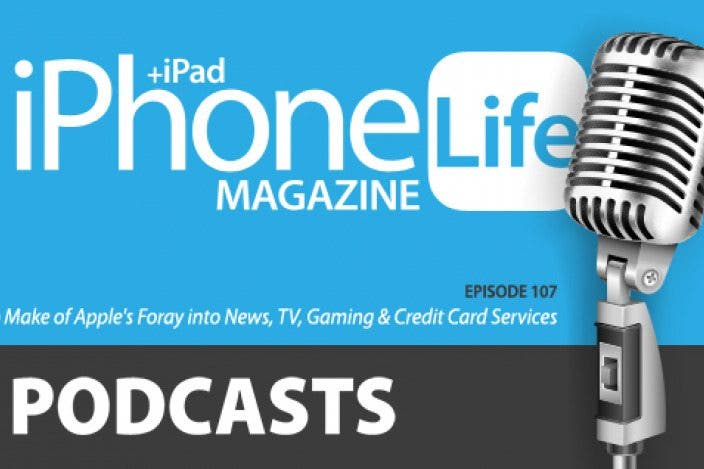

 Rhett Intriago
Rhett Intriago
 Amy Spitzfaden Both
Amy Spitzfaden Both
 Leanne Hays
Leanne Hays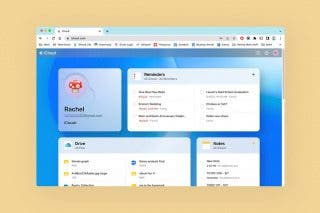
 Rachel Needell
Rachel Needell
 Olena Kagui
Olena Kagui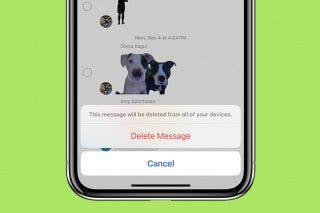
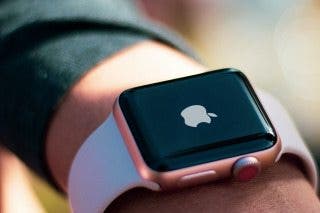
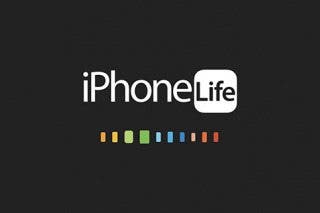
 Susan Misuraca
Susan Misuraca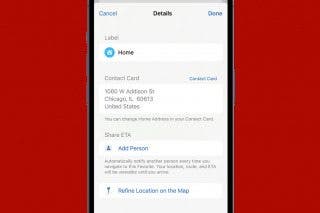
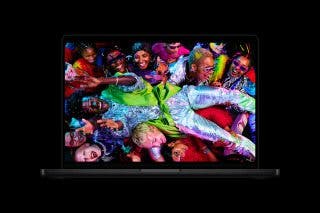

 Kenya Smith
Kenya Smith